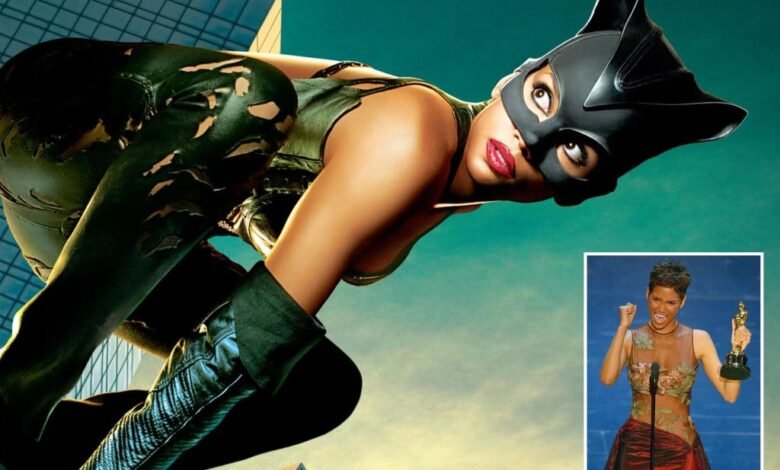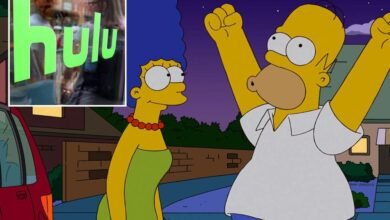From ‘Catwoman’ to ‘Gigli,’ Hollywood’s biggest flops


Acting is an infamously insecure vocation. This applies just as much to gaining a foothold as sustaining an A-lister’s star career. One slip – one flop – and you can tumble into the mud.
This is how Halle Berry felt when, iconically, she showed up to collect her Golden Raspberry award as Worst Actress for “Catwoman” (2004). Gushing as if it were a huge honor, she thanked Warner Bros. for putting her in “a piece of s–t, godawful movie. It was exactly what my career needed! I was at the top! And ‘Catwoman’ just plummeted me to the bottom.”
Two years before, Berry had won a highly significant Oscar for “Monster’s Ball,” making her the first black actress ever to win in the leading category.
She dedicated that Oscar to every “nameless, faceless woman of color” who might find doors opened because of it. The trouble for Berry herself was that the door was swung wide, but turned out to be a cat-flap.
The fee that lured her into this laughing stock was a juicy $14 million, which thrust Berry towards the ranks of Hollywood’s top male earners. Tobey Maguire got $17.5 mllion for the same year’s “Spider-Man 2,” an enormous smash for Sony.
Warner Bros were in the process of resuscitating the terminally uncool DC brand with “Batman Begins,” but they were taking their time. On “Catwoman,” it was a different story: sheer haste made it a fiasco. Executives needed something to fill a blank superhero slate for the summer of 2004, and as soon as they signed Berry, they shoved it through production.
One of the film’s own screenwriters, John Rogers, explained in 2018 that it was a “a s–t movie dumped by the studio at the end of a style cycle, and had zero cultural relevance either in front of or behind the camera.” Ouch.
Berry’s performance and the film took an equal share of ridicule when it came out, bombing both critically and commercially. Her career took a nasty hit, and she would never command anything like the same earnings again from a single role.
Still, she clawed her way back to modest bankability and acclaim, which is more than can be said for her director, Jean-Christophe “Pitof” Comar, who vanished practically without trace after the film’s evisceration.
Berry narrowly avoided starring in “Gigli” (2003), too – the previous year’s biggest bomb. When the bewildering crime comedy was being developed, she and Jennifer Lopez were the two hottest stars considered to play Ricki, the lesbian gangster whom Ben Affleck’s title character seduces.
“She beat me out for the job,” Berry recently said on Dax Shepard’s podcast. “Boy, I’m glad she did. I might not be sitting here right now.”
The shoot was where Bennifer all began – 20 years before they got back together, 22 before J.Lo filed for divorce.
Before the shoot, Lopez had been married for mere months to Cris Judd, a dancer she’d met around the time of her break-up from Puff Daddy. After they wrapped, Affleck took out a full-page trade ad complimenting his co-star, and they were all cuddles at a surprise party for her 32nd birthday that July.
A summer of love followed with their engagement – we have the evergreen evidence, in the “Jenny from the Block” video – and these two became the most overexposed celebrity couple of the day. The film’s marketing campaign needed to ramp up, but consumers were sated.
The film was shaping up as “Bennifer: The Movie,” and already had the look of something hubristic and smug – a super-couple love-in. The ghastly poster showed a rapt Bennifer gazing into each other’s eyes and looking conspicuously Photoshopped, right down to Lopez’s buns in tight low-rise denim.
Many other reasons doomed “Gigli” beyond the star pairing. It was a wildly misconceived mish-mash of genres, with a title no one could pronounce, and a script that was heavily tampered with, when the producer, Revolution Studios’ Joe Roth, rejected the original cut of writer-director Martin Brest. Sony’s marketing division had no idea what to do with it. The romance was beefed up in desperation and a facile happy ending contrived, but after all this, it stood no chance of being hailed as much of a thriller.
When “Gigli,” which cost $75 million, opened to a lamentable $3.8 million in August 2003, Affleck and Brest nursed each other’s wounds. “I was like, it’s just spectacular, it’s a tsunami, it couldn’t be worse. This is as bad as it gets,” Affleck now recalls. It actually did get worse: by the third weekend, the film had been dropped in disgust from a record 97% of the screens it opened on.
The shower of unkind publicity attending all this sure seems to have tarnished the Bennifer engagement, which was called off by January. Both stars took many years to recover – Affleck with a smart pivot to directing and an ultimately unhappy stint as Batman; Lopez by concentrating on her music, before “Hustlers” (2019) and the Superbowl. Their director, like Pitof, crawled into a hole and never emerged.
After “Alexander” (2004) was released, Colin Farrell was tempted to do the same. He rethought his whole approach to acting, and now admits the film’s failure was a crushing blow.
“When I say expectations,” he explained in 2023, “we all had our tuxedos ready. I’m not even joking. We were all like ‘Right lads, we’re off to the Oscars, this is a sure thing.’ Because we had Oliver Stone, we had a story of that magnitude, we had a script that was really moving, just brilliant and so muscular. And then it came out.”
Farrell wasn’t quite the new kid on the block – he’d broken through in Spielberg’s “Minority Report” (2002), as the villain in “Daredevil” (2003), and with a string of hit thrillers. But fronting an epic on this scale, using his native Irish accent to play the Macedonian conqueror, and submitting to the starkest bleach job this side of Jon Heder in “Blades of Glory”? These were decisions that came to bite him back atrociously.
“I do wish he’d listened to me about the wigs,” his co-star Val Kilmer would say. As a review by Wesley Morris zinged, “It’s full of brilliant highlights, and they’re all in Colin Farrell’s hair.”
Media attention zeroed in on the film’s non-heterosexuality, and started to lambaste it from all sides. “Queer Eye for the Macedonian Guy,” scoffed The Post in a preview feature, which also called the hero’s lover Bagoas a “hunky topless Persian castrato.”
Stone was caught between a rock and a hard place – pilloried by the mainstream press, while also being accused of chickening out by the LGBTQ+ commentariat. As he put it in despair to the Sunday Telegraph, “The gays lambasted me for not making Alexander openly homosexual, and in the Bible Belt pastors were up in the pulpit saying that to watch this film was to be tempted by Satan.”
Nothing could quell the conservative outrage, which mobilized into a de facto boycott – and was reinforced by damning reviews across America.”Alexander” did vastly better overseas than it did in the USA, where it opened in miserable sixth place across the 5-day Thanksgiving weekend.
“[To] everyone I met,” Farrell remembers now, “I wanted to say, ‘Have you seen ‘Alexander’? If you have, I’m really sorry.’ ”
Tim Robey’s book “Box Office Poison: Hollywood’s Story in a Century of Flops” is now available through Hanover Square Press
Source link




